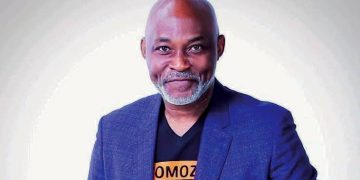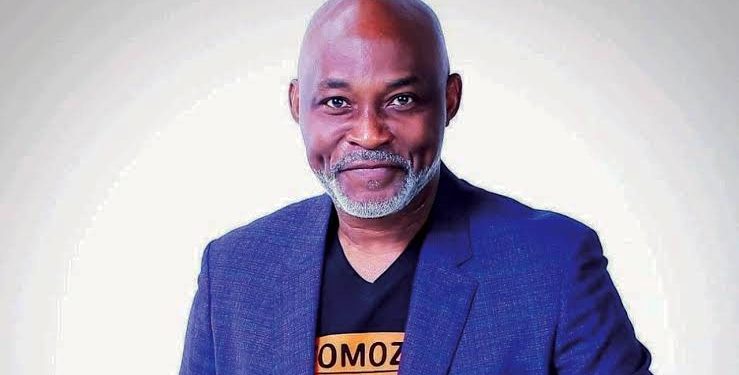Veteran actor, Mr Richard Mofe-Damijo, known mostly by the acronym, RMD, is 60 today. I join well-wishers to celebrate a man who has inspired millions of Nigerians with his talent and creativity. Like many, I knew RMD only by reputation, having never met him in person. But in 2017, our paths crossed when the teenagers in our church asked that we invite him for the Annual Teens Career Conference. I thought I would try, even though I was not sure what to expect. Not only did he accept my kind invitation to come all the way to Abuja from Lagos, he refused any remuneration. He got most of the attention at the conference with the theme, ‘Life is a Stage’. And the teenagers will never forget his admonition that while on the stage of life, they all must write their own scripts!
A rounded artiste, RMD was a journalist before succumbing to the allure of the big stage that mirrors the joy, sorrow, and foibles of society. He had briefly worked at National Concord in the late 80s and acquitted himself as a creative writer. His passion for the written word was what probably led him into founding a lifestyle magazine called ‘MISTER’ in the 90s. His devotion to the creative industry was further exhibited while he served as Commissioner for Culture in Delta State under the Emmanuel Uduaghan administration. He helped push the envelope of arts and culture in the oil-rich state so vigorously that Asaba, the state capital, became the preferred destination for Nollywood producers, actors, and actresses to shoot videos.
A University of Benin graduate of Theatre Arts before he later read law at the University of Lagos, RMD has for more than three decades been one of the biggest names in the Nigerian entertainment industry. In his late twenties, he was in the cast of ‘Ripples’, one of the longest running drama series on the Nigerian Television Authority (NTA) created by Zeb Ejiro before becoming one of the star attractions in the late Amaka Igwe’s ‘Checkmate’, a popular serial that also ran on NTA for four years. Indeed, it will not be an exaggeration to say that the national appetite ‘Checkmate’ helped whet opened the stage for Nollywood to bloom.
Starring accomplished professionals like Kunle Bamtefa, Nobert Young, Mildred Iweka, the late Francis Agu and my friend who has abandoned me, Bob Manuel Udokwu, millions of our people followed the series almost the same way people all over the world followed ‘Game of Thrones’. But it was RMD (who played the role of Segun Kadiri) and his ‘archenemy’, Ann Haatrope (Ego Nnamani, now Mrs Boyo) that made the soap opera a must-watch for many. Incidentally, ‘Checkmate’ brought on full display some of the ills that now define our society: violent cultism, sex-for-grades on university campus, dysfunctional families, irresponsible procreation, etc. But it was asking too much to expect those who hardly pay attention to the plight of the people to take seriously the drama of existence expressed in art form.
Adored, especially by women because of his Sean Connery stature and handsome looks, RMD remains one of the few professionals who excel on stage, television and the silver screen. But perhaps what set him apart so early was that while some of his contemporaries treated the emerging Nigerian film industry with cynicism and contempt out of sheer superiority complex, RMD and a few other trained thespians supported Nollywood with their expertise, experience, exposure, and credibility. Today, the nation is better for it. Some of the movies he has acted in include ‘Out of Bounds’ (1997), ‘Hostages’ (1997), ‘Scores to Settle’ (1998), ‘Diamond Ring’ (1998), ‘Freedom’ (1999), ‘When God Says Yes’ (2003), ‘The Intruder’ (2003), ‘The Mayors’ (2004), ‘I want Your Wife’ (2004), ‘Engagement Night’ (2004), ‘Critical Assignment’ (2004), ‘The Bridesmaid’ (2005) ‘Darkest Night’ (2005), ‘30 Days in Atlanta’ (2014), ‘Oloibiri’ (2015), ‘Okafor’s Law’ (2016), ‘Three Wise Men’ (2016), ‘The Wedding Party’ (2016), ‘Chief Daddy’ (2018) and dozens of others.
In the uncertain times that we live in, people in the performing arts are not just entertainers, they help to relieve us of communal pain and provide catharsis for the burdens we carry. Actors, according to Jackie Apodaca, an associate professor, and the head of performance at Southern Oregon University, are storytellers, who temporarily extinguish our worries as they play out alternate realities on stage or screen. “Sometimes a performer holds up a mirror, shining light on hidden societal sins, but often he or she helps us escape, reminding us of happier times or our greater human potential,” said Apocada. “With actors carrying our frustrations, fears, desires, and hopes, we can let go of the fight—at least for a little while.”
While we have a few successful men like RMD in the profession, the reality is that we live in a society that cannot appreciate performing arts. I am not certain that many Nigerian parents would encourage their children to choose theatre arts as their first career choice today. Yet these are men and women who by their craft help us to improve our understanding of life. As one writer put it, “We compare our life with life in the scene, put ourselves in their shoes and think what would we do. So that drama influences our own lives and our way of thinking, encourages us to review our experience, our principles and change it for the sake of us and our loved ones.”
As part of the therapy to heal our society, we should pay more attention to the arts. Which is why writers and artists, deserve to be celebrated for helping to create a climate of joy and relief in a season of sorrow and forebodings. As he clocks 60 today, my dear egbon, Mr Richard Mofe-Damijo has much to thank God for. But as a nation, we also owe him, and many of his colleagues in creative arts, a debt of gratitude. May he live long and enjoy good health!




































